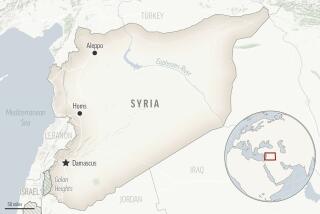5 questions about Syria’s chemical weapons
Syria is believed to have a large stockpile of chemical weapons. U.S. intelligence agencies now suspect that Syrian President Bashar Assad’s government has used small amounts of these chemicals against rebels fighting to unseat him, an assessment shared by Britain, France and, most recently, Israel.
So what is known about Syria’s chemical weapons?
A report citing Turkish, Arab and Western intelligence agencies estimated that Syria has about 1,000 tons of chemical weapons stored at about 50 sites, mostly in the north of the country.
The weapons are believed to include blister agents, such as mustard gas, and more dangerous nerve agents, including sarin and VX. These chemical munitions could be delivered by artillery, rocket launchers, Scud missiles and aircraft.
When are the weapons thought to have been used?
Israel’s top military intelligence analyst, Brig. Gen. Itai Brun, on Tuesday accused Syria of using chemical weapons, probably a sarin-based nerve agent, in two attacks last month near the cities of Aleppo and Damascus.
Last week, Britain and France said there was credible evidence that Syria used small amounts of chemicals in December in Homs, as well as in the attacks near Aleppo and Damascus.
How sure are they?
In a letter addressed to members of Congress on Thursday, the White House said intelligence agencies assess “with varying degrees of confidence” that the Syrian regime has used chemical weapons on a “small scale,” specifically sarin.
The letter says the assessment is based in part on “physiological samples.” Officials declined to elaborate. But Brun said Israel’s assessment was based on reports of victims foaming at the mouth and having constricted pupils. The evidence cited by Britain and France included soil samples and witness testimony.
The Obama administration says it believes the information needs further investigation and corroboration. “For example, the chain of custody is not clear, so we cannot confirm how the exposure occurred and under what conditions,” the White House letter says.
So far, U.S. officials believe that Assad’s government has retained control over the sites where chemical agents are stored. But they are worried that weapons or dangerous materials could fall into the hands of defectors, looters or rival militant groups, including Hezbollah in Lebanon or Al Qaeda-inspired groups in Syria.
The United States has joined Britain and France in calling for a United Nations investigation.
Why use a chemical weapons “on a small scale”?
Defense analysts say such munitions are usually used to inflict mass casualties. Some have suggested that Syria may be testing the United States and its partners by using the chemicals in small amounts to see what sort of response ensues. But others question why Syria would risk goading the United States and its allies into a military intervention when the attacks would not inflict many casualties.
“From a military perspective, it doesn’t make sense to use chemical weapons bit by bit,” chemical weapons expert Ralf Trapp told Foreign Policy in an interview from Geneva. “Why would the regime just put it on a grenade here or a rocket launcher there? It’s just not the way you’d expect a military force to act.”
What does Syria say?
Syria has not signed the Chemical Weapons Convention, which bars the production, stockpiling and use of chemical and biological weapons. But it has never directly acknowledged possessing chemical weapons, either, and asserts that it would not use them -- “if they exist” -- against its own people.
Last month, Syria accused its opponents of using chemical weapons and asked the U.N. to investigate. However, U.N. investigators have not been allowed into Syria to look into the alleged attacks.
ALSO:
U.S. lawmakers call for action on Syria’s chemical weapons
U.S., allies girding for worst-case scenario with Syria’s WMD
Report on Syria’s chemical weapons could put fresh pressure on U.S.
Twitter: @alexzavis
More to Read
Start your day right
Sign up for Essential California for news, features and recommendations from the L.A. Times and beyond in your inbox six days a week.
You may occasionally receive promotional content from the Los Angeles Times.






